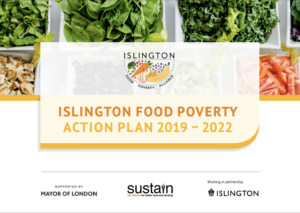Islington Food Strategy
2023-2028
Our food system is broken. Not everyone has access to healthy, safe and affordable food. Local businesses that have people and sustainability at their centre are often not able to survive. We are damaging our planet and nature through our food system practices. Communities need the power to make changes locally.
Our Islington Food Strategy 2023-2028 outlines the ways we will work together to bring about change.
You can read the full version here. But for a quicker understanding of what we want to achieve and how you can get involved, have a look below at actions and commitments that you can take – as an individual, with others in your community, and in your job.
We’re asking everyone who reads this to take 15 minutes of their time to reflect on how you, personally, can help achieve what we want to see in Islington. Even if you can pledge just one change, together we will make a huge difference.

Actions and commitments
We all have a stake in the food system – we’re all part of it every day. From decisions on what we eat and where we buy it from, to being involved with our communities and using our voice for change. All of us can make a significant impact by thinking about what opportunities we have available to us, and being creative in how we approach them.
Our strategy asks everyone to take actions and commitments based on where you have an influence. We’ve set out a selection of actions and commitments for all individuals and organisations below. We’ve highlighted the actions that can be quick wins, particularly high impact and money saving.
If they apply to you, do also check out the additional actions and commitments for:
- Businesses that sell food
- Policy makers and the public sector
- The education sector
- Service providers
- Charities and community groups
- The Islington Food Partnership team
Actions and commitments for all of us
We’re asking everyone who reads this strategy to take 15 minutes of their time to reflect on how you, personally, can help achieve what we want to see in Islington, across our four key themes and principles below. Even if you can pledge just one change, together we will make a huge difference.
- Affordable healthy food for all. Everyone should be able to eat the food they need to thrive
- Sustainable local food economy. Good businesses and entrepreneurs should be able to thrive in Islington
- Climate and nature emergency. The way we live our lives should have a positive impact on nature and the environment
- People-powered change. People and communities coming together is the only route to achieving real change.
Help achieve people-powered change:

 Join, support and promote the Islington Food Partnership, and our Food Activist Network
Join, support and promote the Islington Food Partnership, and our Food Activist Network
 Come along to Islington Food Partnership events, workshops and community meals, or take part in creative activities with us
Come along to Islington Food Partnership events, workshops and community meals, or take part in creative activities with us Take a pledge that would have a positive impact on our food system. This could be something you personally decide, or you could join an existing campaign, for example the Love Food Hate Waste campaign
Take a pledge that would have a positive impact on our food system. This could be something you personally decide, or you could join an existing campaign, for example the Love Food Hate Waste campaign Donate or volunteer with community food services that provide support to those experiencing food insecurity
Donate or volunteer with community food services that provide support to those experiencing food insecurity
Use our voice:
 Ask your local representatives to take action to build a better local food system, and share with them this strategy
Ask your local representatives to take action to build a better local food system, and share with them this strategy Encourage the organisation you work for and any others you are involved in to take the actions and commitments below
Encourage the organisation you work for and any others you are involved in to take the actions and commitments below Encourage your children’s nursery or school to work towards a Healthy Early Years or Healthy Schools Award, to maintain a Food Hygiene rating of 3 or higher, and to comply with the Voluntary Food and Drink Guidelines
Encourage your children’s nursery or school to work towards a Healthy Early Years or Healthy Schools Award, to maintain a Food Hygiene rating of 3 or higher, and to comply with the Voluntary Food and Drink Guidelines
Reduce our waste and energy use:
 Follow the Reduce, Reuse and Recycle principles
Follow the Reduce, Reuse and Recycle principles Don’t buy products with unnecessary packaging, particularly unrecyclable and un-compostable materials, and use reusable shopping bags
Don’t buy products with unnecessary packaging, particularly unrecyclable and un-compostable materials, and use reusable shopping bags
 Reduce food waste, for example by using community sharing schemes or services like Olio or Too Good To Go, or by freezing, preserving and utilising food waste wherever possible
Reduce food waste, for example by using community sharing schemes or services like Olio or Too Good To Go, or by freezing, preserving and utilising food waste wherever possible Use food waste collection services wherever possible
Use food waste collection services wherever possible Use food waste measurement tools to be aware of the waste we produce, and take action to reduce this
Use food waste measurement tools to be aware of the waste we produce, and take action to reduce this- Ensure the correct materials are placed in recycling bins
 Follow the Look, Smell, Taste, Don’t Waste approach, rather than relying on Best Before dates, but do follow the Use By dates. Fruit and vegetables do not need a Use By date.
Follow the Look, Smell, Taste, Don’t Waste approach, rather than relying on Best Before dates, but do follow the Use By dates. Fruit and vegetables do not need a Use By date. Drink tap water when out and about – download and use the Refill app to find places to refill
Drink tap water when out and about – download and use the Refill app to find places to refill If and where you can, choose greener transport options, for example walking, cycling, public transport and electric vehicles
If and where you can, choose greener transport options, for example walking, cycling, public transport and electric vehicles- Switch to a green energy provider and take steps to reduce energy use
Have an impact with our daily decisions on what we eat and where we get it from:

 If you can, buy from local, sustainable and ethical businesses. Support independent local shops and venues, and use street and farmers markets, and local fruit and vegetable box schemes
If you can, buy from local, sustainable and ethical businesses. Support independent local shops and venues, and use street and farmers markets, and local fruit and vegetable box schemes
 Make more plant-based food choices, with less animal protein and more plant protein, which has benefits for both health and the planet
Make more plant-based food choices, with less animal protein and more plant protein, which has benefits for both health and the planet
 Try to eat seasonally where possible, and choose foods that are healthy and not ultra-processed. Try new foods and recipes too
Try to eat seasonally where possible, and choose foods that are healthy and not ultra-processed. Try new foods and recipes too Eat a healthy balanced diet which is low in fat, salt and sugar
Eat a healthy balanced diet which is low in fat, salt and sugar- Look for businesses that are rated 3 or higher in the Food Hygiene rating scheme, and have accreditations such as Sugar Smart and the Healthier Catering Commitment. Ask the businesses you use if they pay staff the London Living Wage, and if the staff receive all the tips. Highlight unnecessary packaging and ask them to reduce their waste
 Try food growing. Anyone can do this, even if you only have a windowsill.
Try food growing. Anyone can do this, even if you only have a windowsill. Join or set up a local food cooperative, to prevent surplus food from going to waste, and get cheaper wholesale prices by buying as a group
Join or set up a local food cooperative, to prevent surplus food from going to waste, and get cheaper wholesale prices by buying as a group If you are eligible for Healthy Start payments, follow the link to apply, or ask for help from your midwife, Health Visiting or your local community centre
If you are eligible for Healthy Start payments, follow the link to apply, or ask for help from your midwife, Health Visiting or your local community centre- Sign up to local community cooking courses to learn new skills and try new foods
Actions and commitments for all organisations
We’re asking every organisation that reads this strategy to host one staff meeting reflecting internally on how you can help achieve what we want to see in Islington, across our four key themes and principles below. Develop from this an action plan to take forward and measure the positive changes you make.
- Affordable healthy food for all. Everyone should be able to eat the food they need to thrive
- Sustainable local food economy. Good businesses and entrepreneurs should be able to thrive in Islington
- Climate and nature emergency. The way we live our lives should have a positive impact on nature and the environment
- People-powered change. People and communities coming together is the only route to achieving real change.
Reflect on and use your assets for positive change, for example:
 If you have venue, meeting or kitchen space, connect with local community groups and charities who can benefit from it when it isn’t being used. Some charities may be able to run training and learning sessions for your staff
If you have venue, meeting or kitchen space, connect with local community groups and charities who can benefit from it when it isn’t being used. Some charities may be able to run training and learning sessions for your staff- If you have green space, or even vertical wall space, partner with a local community organisation to grow food, or lead this as an organisation
 If you have staff members who are particularly passionate about a particular issue (e.g. tackling the climate and nature emergency, or supporting those experiencing food insecurity) enable them to develop a working group and give them real power to make changes
If you have staff members who are particularly passionate about a particular issue (e.g. tackling the climate and nature emergency, or supporting those experiencing food insecurity) enable them to develop a working group and give them real power to make changes- If you have staff with a particular skillset, use some of their time to run community training and learning sessions
 Find ways to share resources, for example cargo bikes or electric vehicles, across different organisations
Find ways to share resources, for example cargo bikes or electric vehicles, across different organisations Explore ways your business may be able to support those experiencing food insecurity, for example by donating surplus food to a nearby community food service
Explore ways your business may be able to support those experiencing food insecurity, for example by donating surplus food to a nearby community food service

 Join, support and promote the Islington Food Partnership
Join, support and promote the Islington Food Partnership- Connect with other organisations to share and develop good practice
 Share relevant local campaigns with your staff and customers to raise awareness
Share relevant local campaigns with your staff and customers to raise awareness
 Conduct an environmental audit of your waste and energy use, and develop an action plan from this
Conduct an environmental audit of your waste and energy use, and develop an action plan from this- Ensure staff are trained and supported to reduce waste and energy use, for example the Reduce, Reuse and Recycle principles, and usage of recycling and food waste bins
- Make it company policy to avoid products with unnecessary packaging, particularly unrecyclable and un-compostable materials
- Use bikes, electric vehicles or sustainable companies for transport and delivery where possible
- Switch to a green energy provider
Make policy and practice changes:
 Pay staff the real London Living Wage to protect and improve the health and household food security of employees. Offer inclusive working conditions, and opportunities to develop and progress to all staff
Pay staff the real London Living Wage to protect and improve the health and household food security of employees. Offer inclusive working conditions, and opportunities to develop and progress to all staff Recognise that we are in a climate and nature emergency, with this at the forefront of business operations. Build the climate and nature emergency into policies and day to day work, and share examples for others to adopt. Focus on the highest impact actions, for example reducing the fossil fuel used directly or indirectly by your organisation
Recognise that we are in a climate and nature emergency, with this at the forefront of business operations. Build the climate and nature emergency into policies and day to day work, and share examples for others to adopt. Focus on the highest impact actions, for example reducing the fossil fuel used directly or indirectly by your organisation Ask for a commitment to tackling the climate and nature emergency in job descriptions, partner contracts and funding provision
Ask for a commitment to tackling the climate and nature emergency in job descriptions, partner contracts and funding provision- Provide training for staff around the climate and nature emergency, and where relevant, how to support those who are experiencing food insecurity
 Allow staff time to volunteer with local charities and community groups
Allow staff time to volunteer with local charities and community groups Sign up to be Breastfeeding Welcome and support breastfeeding employees and customers
Sign up to be Breastfeeding Welcome and support breastfeeding employees and customers
If you procure and provide food:
 Buy direct from local, sustainable and ethical businesses, and increase plant-based food choices, with less animal protein and more plant protein, which has benefits for both health and the planet
Buy direct from local, sustainable and ethical businesses, and increase plant-based food choices, with less animal protein and more plant protein, which has benefits for both health and the planet Procure from businesses that have Food Hygiene ratings or 3 or higher, and have accreditations such as Sugar Smart and the Healthy Catering Commitment. Ask the businesses you use if they pay staff the London Living Wage. Highlight unnecessary packaging and ask them to reduce their waste
Procure from businesses that have Food Hygiene ratings or 3 or higher, and have accreditations such as Sugar Smart and the Healthy Catering Commitment. Ask the businesses you use if they pay staff the London Living Wage. Highlight unnecessary packaging and ask them to reduce their waste Offer robust, sustainable procurement contracts to those you buy from
Offer robust, sustainable procurement contracts to those you buy from Understand the supply chain of where your food comes from, with a sustainable procurement policy where appropriate
Understand the supply chain of where your food comes from, with a sustainable procurement policy where appropriate- If you provide food, either catering or retail, register with Islington, talk to your environmental health team for advice, provide some staff with food hygiene training and achieve 3 or higher on the Food Hygiene rating scheme
Read the full version of the Islington Food Strategy 2023-2028 here.
Building on solid foundations
Islington Food Poverty Action Plan 2019-2022
Our Islington Food Poverty Action Plan 2019-2022 outlined the ways we worked across the borough so that everyone in Islington eats at least one healthy meal each day.
Our Progress Report for 2020-2021
Our Progress Report 2020-2021 presents key highlights of our work towards the four Aims of the Food Poverty Action Plan.
The Islington Food Partnership is led collaboratively by

With huge thanks to our Islington Food Partnership members who collaboratively developed this strategy, and lead ongoing work and initiatives across the borough. Our member organisations include




If you are an Islington resident looking to find community food services or support
Please ring the Manor Gardens Welfare Trust Assistance line on:
07538 562128
or email us
Lines are open Monday – Friday from 9am to 5pm.
Anything else? Get in touch!
In case you have any questions or want to join the partnership please don't hesitate to get in touch with us


